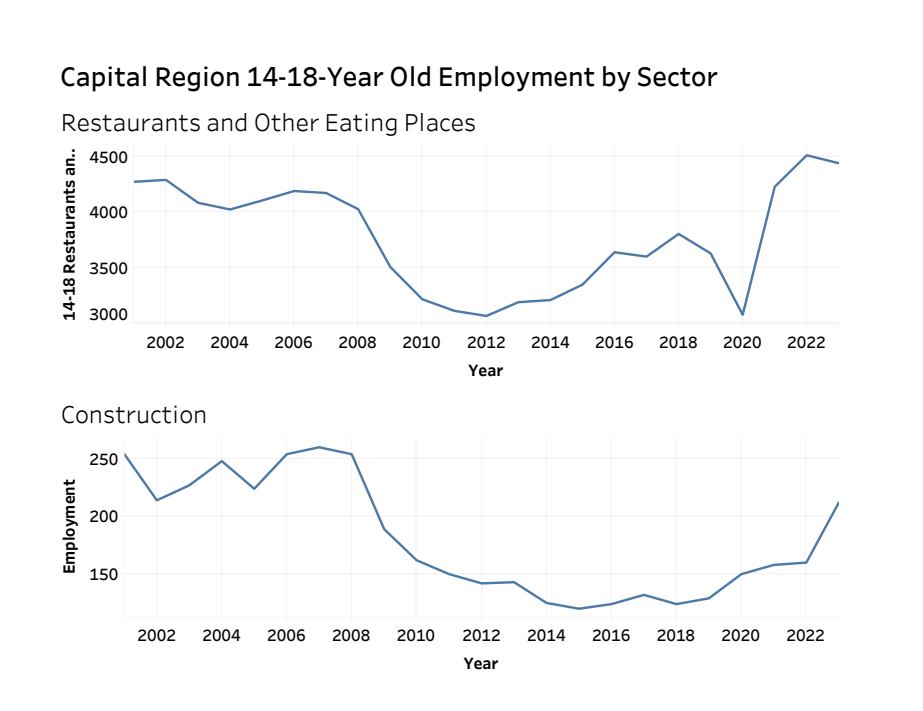High School-Aged Worker Employment Hits 15-Year High in the Capital Region
Employment among the Capital Region’s high school-aged workers climbed to a 15-year high in 2023, driven by job gains in the construction and restaurant industries, according to a Center for Economic Growth (CEG) analysis of data from the U.S. Census Bureau’s Longitudinal Employer-Household Dynamics.

In 2023, the eight-county Capital Region averaged 12,210 employed workers between 14 and 18 years old, up 1,836 (17.7 percent) from before the pandemic five years earlier. That was this demographic’s highest employment since 2008. Employment growth among high school-aged workers surpassed that for other age brackets in the region, except 65 to 99 years old.
The biggest driver of high school-aged worker employment was the restaurant and other eating places industry, which increased over the last five years by 811 (22.4 percent) to 4,436. That was the most jobs among this age group on record, with data going back to 2001. During the five-year period, high school-aged employment increased by 83 (64.3 percent) in the construction sector to 212. Nearly two-thirds of those construction job gains came from the specialty trade contractor subsector, which include HVAC, electrical and plumbing contractors, service providers and installers.

Overall, high school-aged workers account for a small portion of the Capital Region’s total employment: 3 percent in 2023, compared to 2.5 percent in 2019. Other sectors that saw sizeable employment gains in high school-aged workers over the last five years included agriculture (18.4 percent), manufacturing (18.6 percent) and transportation and warehousing (82.7 percent).
Capital Region BOCES is training high school students for careers in these industries. In the 2023-2024 school year, 302 students were enrolled in its construction programs, including 86 in building trades, 109 in electrical trades, 39 in HVAC trades and 31 in residential construction/heavy equipment. An additional 129 students were enrolled in Capital Region BOCES’s culinary arts programs and 89 in welding and metal fabrication.
In 2022, Capital Region community colleges awarded more than 100 associate’s degrees and certificates in engineering and engineering technologies fields. Programs offered at Hudson Valley Community College that prepare students for careers in manufacturing including Advanced Manufacturing Technology (A.O.S), Electrical Engineering Technology-Electronics (A.A.S.), Electrical Technology: Semiconductor Manufacturing Technology (A.A.S.), Mechatronics (A.O.S.) Mechanical Engineering Technology (A.A.S.), Engineering Science (A.S.), Semiconductor Technology (certificate), Welding and Fabrication (A.O.S.), Biotechnology (A.A.S.), Biological Sciences (A.S.), Biotechnology (certificate), Welding (certificate), and Computer Aided Drafting (certificate). Schenectady County Community College also offers degrees in Biological Technician (A.A.S.), Biology Concentration (A.S.) and Nanoscale Science Concentration (A.S.) and SUNY Adirondack offers Engineering Science (A.S.) and Mechatronics (A.A.S.).
CEG INITIATIVES
As a New York State MEP center, CEG also helps Capital Region manufacturers increase their productivity by providing a menu of technical support services, such as Lean Enterprise Training, ISO Certification Assistance, Technology-Driven Market Intelligence, and CoreValue benchmarking assessments.
CEG also supports workforce development for manufacturing by serving as a group sponsor for apprenticeship programs as well as coordinating with secondary schools and colleges and universities to align their curricula with the talent needs of local manufacturers.
Don’t miss these insights into the trends that are shaping the Capital Region’s economy.
Sign up for CEG’s e-news and follow us on:
















